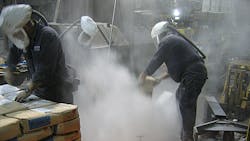Piqua Champion Foundry in Piqua, OH, was cited recently by the U.S. Department of Labor’s Occupational Health and Safety Administration for 20 violations of federal safety standards, including seven repeat violations and 13 serious violations. The charges carry proposed penalties of $57,140.00.
Piqua Champion Foundry produces gray iron and Ni-hard castings, products typically used in fixtures for mining and construction equipment, or wear liners for heavy industrial equipment.
The foundry has not commented on the charges. As in all such case, OSHA granted Piqua Champion Foundry 15 days from its receipt of the violations to comply with the penalty, request a meeting with OSHA’s area director, or contest the charges to the independent Occupational Health and Safety Review Commission.
The federal agency stated that during a January 2014 inspection it determined that nine workers at Piqua Champion Foundry had been exposed to dangerous levels of silica dust, respiratory hazards, and unsafe work conditions in process like casting grinding and furnace relines.
OSHA stated the foundry did not provide medical evaluations for employees using respirators; failed to monitor supplied breathing air for carbon monoxide; and did not properly mark respirators that needed new filters.
Also, Piqua Champion Foundry was cited for repeatedly failing to develop machine-specific procedures for its electric furnace and mold machinery to ensure workers did not risk amputation or death when servicing and maintaining machines in use, and for not communicating hazards properly during forklift training.
OSHA added that it discovered similar violations during a 2009 inspection of the site.
OSHA’s terminology identifies a “serious” violations as one from which death or serious physical harm may result, and which an employer knew or should have known exists. “Repeat” violations are those about which an employer has been cited within the preceding five years, at any other facility in federal enforcement states.
The “serious” violations concern workers’ exposure to airborne silica dust levels higher than the permissible exposure limit for a shift; failure to implement controls to reduce exposure; and to train workers on silica hazards. Crystalline silica exposure has become an area of safey emphasis for OSHA in recent years. It noted that inhalation of small crystalline silica particles puts workers at risk for silicosis, lung cancer, chronic obstructive pulmonary disease and kidney disease.
Last fall, the agency proposed a new safety rule to protect workers exposed to respirable crystalline silica, a rule it estimates would save nearly 700 lives and prevent 1,600 new cases of silicosis annually.
OSHA directs workers to protect workers from dangerous silica dust by providing engineering controls, respiratory protection, training and monitoring exposure levels.
The agency also cited Piqua Champion Foundry for other violations of its respiratory protection standards.
"Occupational exposure to silica dust often occurs as part of common workplace tasks in foundries where operations can result in workers inhaling small crystalline silica particles in the air," stated OSHA’s Cincinnati area director, Bill Wilkerson.
"Piqua Champion Foundry has a responsibility to give employees the tools and training they need to protect themselves from this debilitating, but common danger,” he added. “Piqua has repeatedly failed to keep its workers safe, and that is unacceptable."
About the Author
Robert Brooks
Content Director
Robert Brooks has been a business-to-business reporter, writer, editor, and columnist for more than 20 years, specializing in the primary metal and basic manufacturing industries. His work has covered a wide range of topics, including process technology, resource development, material selection, product design, workforce development, and industrial market strategies, among others.
